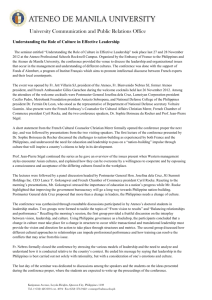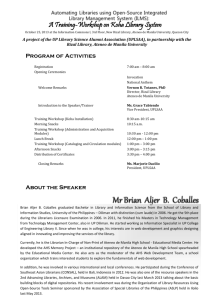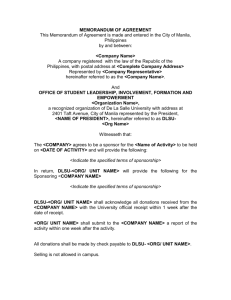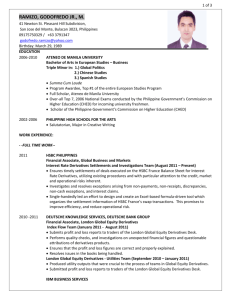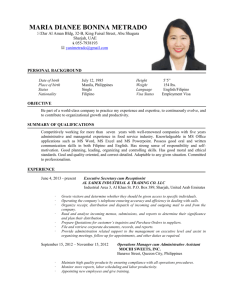E-mail: Study Program: Bachelor Sociology Exchange semester: First semester
advertisement
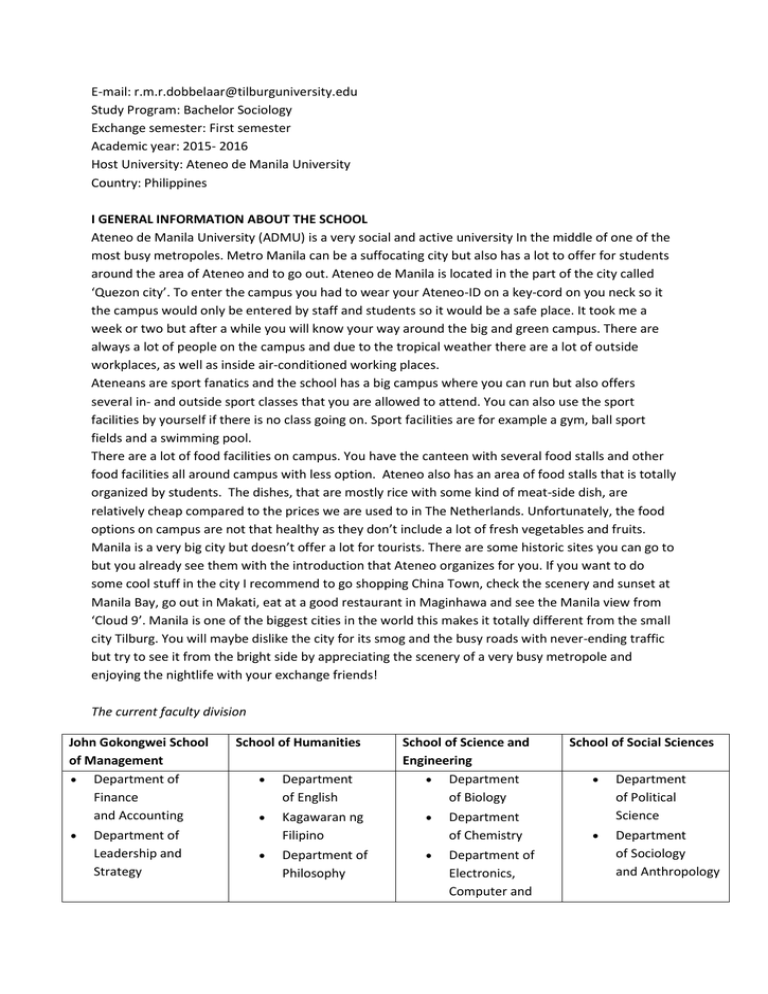
E-mail: r.m.r.dobbelaar@tilburguniversity.edu Study Program: Bachelor Sociology Exchange semester: First semester Academic year: 2015- 2016 Host University: Ateneo de Manila University Country: Philippines I GENERAL INFORMATION ABOUT THE SCHOOL Ateneo de Manila University (ADMU) is a very social and active university In the middle of one of the most busy metropoles. Metro Manila can be a suffocating city but also has a lot to offer for students around the area of Ateneo and to go out. Ateneo de Manila is located in the part of the city called ‘Quezon city’. To enter the campus you had to wear your Ateneo-ID on a key-cord on you neck so it the campus would only be entered by staff and students so it would be a safe place. It took me a week or two but after a while you will know your way around the big and green campus. There are always a lot of people on the campus and due to the tropical weather there are a lot of outside workplaces, as well as inside air-conditioned working places. Ateneans are sport fanatics and the school has a big campus where you can run but also offers several in- and outside sport classes that you are allowed to attend. You can also use the sport facilities by yourself if there is no class going on. Sport facilities are for example a gym, ball sport fields and a swimming pool. There are a lot of food facilities on campus. You have the canteen with several food stalls and other food facilities all around campus with less option. Ateneo also has an area of food stalls that is totally organized by students. The dishes, that are mostly rice with some kind of meat-side dish, are relatively cheap compared to the prices we are used to in The Netherlands. Unfortunately, the food options on campus are not that healthy as they don’t include a lot of fresh vegetables and fruits. Manila is a very big city but doesn’t offer a lot for tourists. There are some historic sites you can go to but you already see them with the introduction that Ateneo organizes for you. If you want to do some cool stuff in the city I recommend to go shopping China Town, check the scenery and sunset at Manila Bay, go out in Makati, eat at a good restaurant in Maginhawa and see the Manila view from ‘Cloud 9’. Manila is one of the biggest cities in the world this makes it totally different from the small city Tilburg. You will maybe dislike the city for its smog and the busy roads with never-ending traffic but try to see it from the bright side by appreciating the scenery of a very busy metropole and enjoying the nightlife with your exchange friends! The current faculty division John Gokongwei School of Management Department of Finance and Accounting Department of Leadership and Strategy School of Humanities School of Science and Engineering Department of Biology Department of English Kagawaran ng Filipino Department of Philosophy Department of Chemistry Department of Electronics, Computer and School of Social Sciences Department of Political Science Department of Sociology and Anthropology Department of Marketing and Law Department of Theology Department of Quantitative Methods and Information Technology Department of Modern Languages Department of Interdisciplinary Studies Fine Arts Program Communications Engineering Department of History Department of Environmental Science Department of Economics Department of Psychology Health Sciences Program Department of Information Systems and Computer Science Department of Education Department of Communication Department of Mathematics European Studies Program Department of Physics Chinese Studies Program Japanese Studies Program Development Studies Program Ateneo has Centers of Excellence in: Business Administration, Chemistry, English, Entrepreneurship, Information Technology, Literature, Mathematics, Philosophy, Physics, Psychology and Sociology. It has Centers of Development in Biology, Environmental Science and Filipino The number of undergraduate students is roughly 7500 and the number of postgraduates is around 4000, which gives ADMU a total of 11,500 students. Due to a change of their academic calendar to the European and American schedule that begins in August or September, they had the biggest number of exchange students in time during my batch. We had a total of 100 exchange students who were mostly from Europe, some Asian countries and a few from the USA. They expect that the number of exchange students will only increase in the coming years. The number of exchange students in the second semester is smaller, namely 60, and the diversity of nationalities is less. The study structure is different from what I was used to in Tilburg. You had work to do during the whole semester. There was either a quiz, midterm, long-test, paper, presentation or other individual or group project every week. This gives you something to do every week but I thought about it quite positive because you don’t have to do a lot of work at the sudden at the end of the semester. In ADMU you collect points and thus build up your grade during the whole semester so you grow gradually to your final grade. The final exams are still very important and the biggest tests, mostly they compose the biggest part of your grade. Classes are compulsory and were thought interactively so by talking a bit about the subjects every weak I learned a lot about them and the information also sticks into your mind better. II PRACTICAL INFORMATION Information before you left I knew all application requirements a long time before I finally had to hand them in on the 15th of April. I received the first pre-arrival information about courses and housing on the 2nd of July and other information about the university on the 15th of July. I didn’t experience any difficulties with this. Note that you have to hand in your application requirements in hardcopy and if you want to save costs it is better to send them a few weeks before the deadline. Visa procedure and arrival To get your visa for the Philippines you have to go personally to the embassy in The Hague(Den Haag) or make an appointment at the Honorary Consulates in Amsterdam or Rotterdam. You have to hand in a passport size photograph taken within the last six months, have a round-trip flight ticket, a photocopy of your passports bio-page, proof of sufficient funds that can finance your stay and take your passport valid for at least six months with you. Thereby, you have to fill and hand in an application form. Make sure you don’t make the mistake of applying for a single entry Visa but a multiple entry visa. If you apply for a single entry visa you can stay in the Philippines for 59 days and after this your extension will only be 30 days. If you have a multiple entry visa your extensions after this will be 59 days as well for a period of half a year. The fee for the single entry visa is 27 euros and the fee for the multiple entry visa for 6 months is 54 euros. If all the requirements are fulfilled and handed in at the embassy you have to leave your passport and they will make your visa and stick it on one of the pages of your passport. If you leave an envelope with a self-addressed stamp (aangetekende postzegel) at the embassy they will send your passport back to your address. If you don’t do this, you have to personally pick your passport up. The self-addressed stamp is only available at Dutch post-offices and is a different stamp than the normal stamps you normally use. It is not valid to use normal stamps for sending personal documents as your passport, so make sure you have the right self-addressed stamp. You need a ticket out of the Philippines for being able to enter the country. Ateneo already asks you to book a round-trip ticket and hand it in together with your application forms. I booked a round-trip flight ticket but it is hard to decide which date you want to go home after your semester ends. If you want to decide this later, my advice is to book your ticket to the Philippines and book a ticket out of the Philippines when your first 59 day visa ends. Make sure you book another ticket out of the Philippines before you leave because you have to show a ticket out of the Philippines every time you want to enter the country. The OIR gives you advice on leaving the airport and even arranges a taxi if you want to. You can fill this in on one of the arrival forms you receive with the application forms. I arranged my own taxi at the airport by following the pre-given advice of the OIR and this taxi dropped my safely at my house in the Philippines. The first reception at school was in the OIR to apply for the Special Study Permit in the week before the introduction. The OIR didn’t know when we would arrive but they always were prepared to welcome students and give them information and the needed forms . Orientation/Introduction activities In the week before the lectures begin, the first week of August, is the orientation week. We had introduction activities on Monday, Tuesday and Wednesday. This introduction week was organized by the OIR and ASEC, the Ateneo Student Exchange Council. The orientation had some boring moments when important information was communicated but when this was finished the fun began. The activities were nice to attend because they were organized in collaboration with students. We were introduced to the campus and its facilities and the last day we visited historical sites and a museum in Manila. ASEC also arranged the buddy system and buddies were members of ASEC. Buddies were randomly addressed and you met them during an activity with games. Housing The OIR has a booklet with several accommodations that are possible within the area .You can rent a condo in one of the residences in the neighborhood, live in a shared dorm on campus or share a house within a compound area with other exchange students. You send a housing form to the OIR together with your application with the option if you want to live on a dorm on campus or arrange an accommodation together with help of the OIR after your arrival. I lived in one of the houses in a compound area near the school and shared this house with seven other exchange students. I was very satisfied with this kind of housing because living together with other exchange students in a house was a lot of fun and the house was very spacious. Living Costs The costs of daily life are much cheaper in the Philippines compared to the costs of living I had in Tilburg. My rent was half of what I paid in Tilburg and meals can costs between 50 cents and 2 euros. I recommend students to commute if they have the time to save some euros on taxis. The biggest tip I can give is that eating in the normal ‘eateries’ is cheaper per meal than buying everything in the supermarket and cooking yourself. In general everything is much cheaper, from cutting your hair to transport and going out. I could finance everything easily with my student loan and even saved a lot of money because daily life was cheaper. With all the money I saved I financed my traveling. I think is spent half of my money on daily life and the other half on traveling. Approximate monthly budget on exchange Housing Food Transport Books Miscellaneous Going out Traveling € 150,€ 140,€ 20,€ 5,€ 100,€ 80,€ 250,- Academic Calendar I arrived on the 29th of July and the introduction week begins in the first week of August. The real lectures begin the week after the introduction, this was the 10th of August for me. There are no breaks in between the beginning and the end of the semester but there definitely are some days you are off because of (inter)national holidays. The last lecture week was from the 30th of November till the 4th of December. The week after this, the first full week of December, was the final exam week. The International Office Ateneo has a very active and concerned Office of International Relations(OIR) and they are officially responsible for the exchange students. This office is very helpful and you can always drop by if you have questions. They communicate through e-mail and Facebook so you are always reached. Their forms and regulations are quite clear from the beginning on. They help you through the bureaucratic regulations and try to make them as easy as possible. The OIR works together with the student association for international students called ASEC (Ateneo Student Exchange Council). They organize the fun activities for exchange students and help with all the questions concerning Ateneo, study materials, OIR and more. Exchange promotion There was a promotional fair in Ateneo during my semester abroad. They asked me if I could promote my university on this fair but I had classes and a test during the available time so I was unable to promote. Furthermore I talked with other students about participating in an exchange and answered their questions about The Netherlands and Tilburg University if they asked them. Social Activities The OIR and ASEC organized the welcome week and the closing event for exchange students. This was visiting the city, doing several activities and having dinner together. Next to this, ASEC also organized some parties during the semester where exchange students, members of ASEC and other students from Ateneo can come to. Ateneo is a school where almost every student is very active as a member from an association and a lot of events are always organized. They are very open and social so making friends is definitely not difficult. I had contact with both local and exchange students. Contact with exchange students is very easy because everybody knows each other and there are places where you meet or go out every week. I made friends with local students through activities of ASEC and in my classes. I traveled a lot during my semester in the Philippines. Traveling within the Philippines is cheap and exchange students always organize a trip during the weekends as it is easy to take a bus to go somewhere. To renew your Visa you can pay for a new Visa but you can also leave the country a few times. I advise to take a cheap flight to another Asian country for a few days during the weekends as this costs maybe as much as paying for a new Visa. The Visas of exchange students expire around the same date so I always traveled with other exchange students and this was a lot of fun. Thereby, you check another country out! Culture and Language As I expected I experienced a culture shock in the Philippines but it was not necessarily unpleasant. One of the reasons I chose the Philippines was to be surprised by a total different culture. My host culture is different from my own culture in several aspects. People appear to be more open, even strangers will always greet you and are always happy to start a conversation with you. Classes are small and other students are very social but also teachers are very involved with their students. We even had pizza together in some classes to celebrate the last classes. Some concepts are perceived totally different, like time. Filipino’s are not that punctual at all and if they give you a time indication or you set a time to meet they will come mostly too late. What I learned about my own culture is that Dutch people are indeed direct, but that our norms are also to treat people equal. What was different about my host culture was that I experienced that Filipino’s care a lot about their family. They like to have big celebration for family events and include more relatives into their personal circle than most Dutch people do. I liked the hospitality and helpfulness of my host culture. While being in the Philippines I never felt that suspicious about people and I experienced a lot of situations where people were very hospitable. What I don’t like about my host culture is the big social difference. You will experience that the elite and rich can study and you will meet them in ADMU but you also see a lot of poverty around the city. I also met people outside manila while I was traveling and speaking to these people you will hear that there is inequality and some unfair practices going on in the country. At the end of the semester I can definitely say that I learned much about the culture of my host country. It will take you some time to understand some practices or to make some differences in practices in the country your own but at the end you will notice that you know your way around pretty well. Some Filipino’s asked me if I will come back to the Philippines after my semester and I always answered that I definitely will. Knowing the culture in a country better makes traveling much more fun because you somehow feel you know how a lot of practices work. What I also appreciated in the Philippines was that the majority of the inhabitants talk English very well so I could always communicate perfectly with them wherever I was. The students in Ateneo speak English fluently and for some it is even their first language so I never really had to experience a language problem. Personal Development I learned a lot about myself and others during my exchange. I am much more aware and finally understand the cultural boundedness of our thoughts and behaviors. I think my exchange influences my future career possibilities in a way that i have a deep experience with other cultures, living abroad and talking English with different nationalities for a long time span. Being more aware of other cultures and habits broadens your world view and learned me how different people from several countries see and perceive the world differently from how I see it. My best experience was all the traveling and interacting with a culture that is not similar to my own. What I thought was the worst is that you stand out as a Caucasian in an Asian country. Having people react to you in a different way and experiencing prejudices based on my appearance was something that I was never faced with so obvious before. I learned a lot from this and found a way to deal with it and turned It sometimes around with a lot of humor. Overall, my exchange period was an amazing time in my life. I met many people and some became very good friends. I dealt with a culture that is so different and surprised me so many times. The Philippines’ landscape is always amazed me and the inhabitants where kind and hospitable people. The university had a very nice learning environment, a lot of facilities, interesting eye-opening courses and my study mates were always the kindest. III ACADEMIC INFORMATION Academic level at host university The courses at Ateneo are mostly in English, only a very few are taught in Filipino. I took the courses; Cultural Anthropology, Woman and Gender in Philippine History, Language and Culture, Cultural Studies of Technology and Comparative Studies of Culture. All these courses were taught in English. I liked all the courses I took but I would expeccially recommend Cultural Anthropology, Language and Culture and Cultural Studies of Technology because these courses had the most interesting content in my opinion. They gave me new eye-opening insights and taught me to be socially aware about different topics. The education at Ateneo is very different from the one I am used to in Tilburg. For the first time all my lectures were taught in English, I had to make midterms and quizzes during the whole semester but he biggest workload were all the papers I had to write. In total I wrote 25 papers during the whole semester, varying from 1 page to 6 pages, mostly by myself and sometimes with a group. So you can guess that the teaching was more practical as I was asked to write a lot during the semester next to attending all the lectures. I attended almost all the lectures I had during my semester as it was only allowed to skip lectures 3(3 hour classes) or 6 (1,5 hour classes) times per semester. If you exceed this amount you are mostly excluded from the course and can’t pass it anymore. My teachers are were very personal and concerned with the results of students. What also caught my attention is that they were very knowledgeable in their disciplines. I was happy that I finished my semester with good grades, varying from B, B+ and A. Exams I had several different types of tests. For some courses I had to make quizzes and these could be one in a few weeks or almost every week. Most of my courses gave me a mid-term in the middle of the semester. Every course gave me assignments to write papers, varying from 1 to 6 pages. One course asked me to present. In the end, all the courses gave a final exam. Other You can use the facilities in the libraries. Next to a collection of books, these libraries contain silent rooms, (group-)study rooms, computers, printers and a collection of books. All these facilities are available all over the campus in different places. Food facilities are also present at different location on the campus but you have to search if you want to find vegetarian food options or fruit and vegetable dishes in general. Description of Courses Course SA119: Cultural Anthropology SA123: Comparative studies of Culture HI189.11: Woman and Gender in Philippine History LING160: Language and Culture IS163.3: Cultural Studies of Technology Course Exam level/Prerequisites BA/None Written ECTS Comments 6 BA/None Written 6 BA/None Take-home essay 6 (6 pages) Mid-term, quizzes and papers Presentation, assignments and papers. Mid-term, papers. BA/None Written 6 BA/None Written 6 Mid-term, assignments and papers. Mid-term, quizzes and papers. Tips for the future students I would absolutely recommend an exchange period to students who are interested in studying abroad once. You make friends really easy with other exchange students and you will experience so many things that will become great memories. Especially making friends and experiencing adventures is easy in Philippines. Ateneans are very social and always open to others. As a foreigner they were always curious to hear how your experience here in the Philippines is and they will frequently invite you to do something fun together. Special advice that I want to give to future exchange students who go to Ateneo de Manila or the Philippines is that, even though all the Filipino’s speak a word of English, it comes in handy to learn a few words of Tagalog (The Philippine Language). You will notice that the inhabitants are surprised you took the effort to learn at least a bit of the language and they appreciate this. I had the idea they were more eager to help me while I was traveling outside of Manila. People learn English in the Philippines as their second language but in the areas outside of Manila you will notice people sometimes struggle with talking English. Take some clothes for colder weather because busses and some public areas are so cold from the air-conditioning that you will need them to not get sick. The most important thing is that you have to go with an open minded stance. Some things or concepts are totally differently perceived in the Philippines than we are used to in The Netherlands. Examples are that people are always very nice and really want to help you, but this persuasion in helping you also can turn into giving you directions to a certain location that they don’t know at all. A few times, this resulted for me in walking in the wrong direction because people were too shy to say did didn’t know where I had to go. Another example is ‘Filipino Time’, this is the different concept of time Filipino’s have compared to us. They are not that punctual and if they give an indication of time it mostly is not that correct, so 30 minutes can be 30 minutes or maybe one hour. One thing that I would do different if you I could do it over is that I would make sure to apply for the Multiple Entry Visa and not the Single Entry one.
